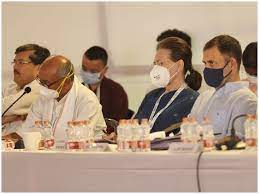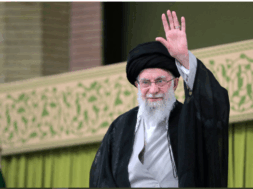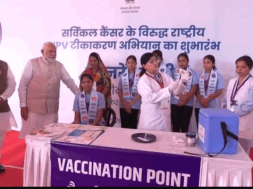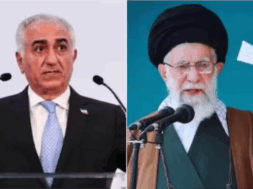
Congress Leadership Give-in to the Dissenters on CPB, to Support “Quota Within Quota” Demand
Manas Dasgupta
NEW DELHI, May 14: The Congress leadership is learnt to have accepted a key demand of the dissenters in the party to constitute the Congress Parliamentary Board which would replace the Congress Election Committee in deciding the party candidates for the Parliamentary and the state Assembly elections.
The decision has reportedly been taken at the three-day party conclave “Chintan Shibir” being held at Udaipur in Rajasthan where the party leadership also decided to change its stance on “quota within quota” which it had opposed earlier but now decided to support for the benefits of the backward classes and women. The decisions taken at the Udaipur meet would now be required to be approved by the Congress Working Committee, the highest decision making body in the party.
Gandhi loyalist, say sources, are determined not to allow the proposal of the Congress Parliamentary Board to be accepted and there is a tussle on this in the party. Whether there will be elections of this new post or it will be constituted by regular members or nomination by the party president have been left to the top Congress body.
The big question on the future of the party leadership, however, has remained unanswered with no indication from Rahul Gandhi if he intends to contest the party’s presidential elections to be held later this year. He resigned following the party’s poor poll performance in the 2019 Lok Sabha elections. Sources close to him have indicated that he still feels that a non-Gandhi should lead the party.
The dissenters who are participating in the Chintan Shibir, barring senior party leader Kapil Sibal, stayed together and united at the conclave, sources said, adding that they could make a statement once a consensus emerges. On the question of alliances with other political parties, the 137-year-old party wants to have state-wise alliances with various parties who are not aligned with the BJP.
Keen to regain the support of Dalits, tribals, OBCs and minorities, the Congress has planned to raise the representation of Scheduled Castes (SCs), Scheduled Tribes (STs), Other Backward Classes (OBCs) and minorities to 50 per cent at all levels of the organisation as well as raise the issue with the government for reservation for them in the private sector and reservation for OBCs in Parliament and Assemblies. Interestingly, it is also discussing a proposal to demand quota within quota for SC, ST and other backward classes (OBCs) in the Women’s Reservation Bill, which had been hanging fire for several years.
The Women’s Reservation Bill to reserve one-third of all seats for women in the Lok Sabha and the state legislative assemblies was passed by Rajya Sabha in 2010 but the UPA government could not take it forward due to strong opposition from SP’s Mulayam Singh Yadav, RJD’s Lalu Prasad Yadav and the then JD(U) chief, Sharad Yadav, who had demanded ‘quota within quota’ for SC, ST, OBCs and minorities in the bill.
The Congress had strongly resisted the idea then but 12 years later with its vote bank shrunk and electoral influence considerably eroded, he party is now thinking about changing its stand and demanding quota within quota. At the Chintan Shibir in Udaipur, a panel on social justice and empowerment set up by the Congress president and headed by Salman Khurshid has proposed that the Women’s Reservation Bill should have quota within quota. It is to be seen whether the demand will find a reflection in the Udaipur declaration that the party will adopt on Sunday.
The panel also wanted the party to take a stand and demand a caste-based census of all communities, a central legislation on SC/ST sub-plan and similar legislations at the state level, among others. “The party should push for passage of the Women’s Reservation Bill but there shall be a quota within quota… There should be proportionate representation for SC, ST and OBC women,” said Congress leader K Raju, one of the members of the group.
Khurshid said there was no inconsistency on the part of the party regarding quota within quota in the Women’s Reservation Bill. “We moved on from that position where we had strategically felt that the quota for women should come first,” he said.
“Sometimes you have to push legislation strategically. We were committed to a quota for women. The problem about quota within a quota was that we had assumed that there would not be easy agreement and consensus on that. And as a result, we would lose out on the reservations for women at that stage. Therefore, a conscious, strategic decision was taken that let’s get the quota (for women) first and then we will see about further segmentation,” Khurshid added.
“Now we have lost a lot of time. And politics has also undergone a very, very important significant change since then. We do believe that now is the right time to make it very clear where you stand. We stand for women participating in a fulsome manner… in the sense… that women from all categories should be able to participate. We don’t want any people to believe that there is a hidden agenda that you bring in women but you bring in women only who find it easy to get elected. Therefore, after thoughtful consideration… and inputs that we got from all our colleagues… and from people from the social sector we came to the conclusion that we should recommend to the CWC that now the time has come to take the bull by the horns that make sure that we get quota within quota all pushed at one go,” Khurshid said.
Senior Congress leader Kumari Selja said the UPA could not pass it then because of many contradictions in the coalition.
The group has also recommended a series of organisational reforms to “show to the weaker sections that the party is committed to SC, ST, OBCs and minorities”.
The proposals at the Udaipur “Chintan Shibir” include setting up a social advisory council in the party to closely examine social justice-related issues that the party has to focus on and raise, implementing 50 per cent reservation for leaders from SC, ST, OBCs and minorities at all levels, from the booth level to the CWC, up from the present 20 per cent enshrined in the party’s constitution, giving more representation to various sub-castes within these communities and calling of a special session of the CWC, PCCs and district Congress committees once in six months to discuss the issues concerning SC, ST and OBCs.













